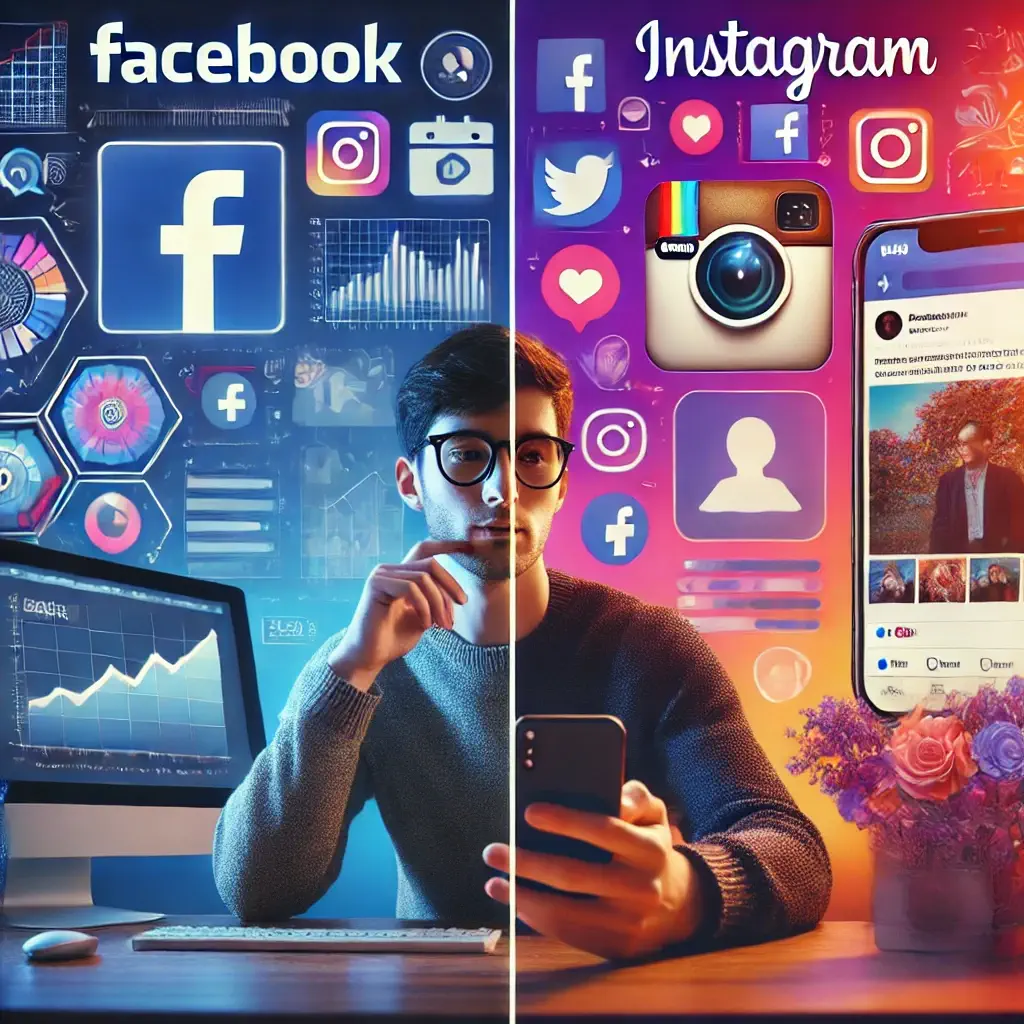Facebook vs Instagram: Discover which platform is better for your business in 2024. Compare audience, engagement, and content strategies.
Facebook vs Instagram: Which Platform Is Better for Your Business in 2024?
The Audience Dilemma
When it comes to choosing between Facebook and Instagram, knowing your audience is crucial. Facebook remains a powerhouse for businesses targeting an older demographic. With over 2.9 billion monthly active users, it’s a platform where you can connect with a diverse and expansive audience.
If your business targets baby boomers or Gen X, Facebook’s wide reach makes it a strong contender.
On the other hand, Instagram is the go-to for businesses focusing on younger audiences, particularly millennials and Gen Z. With its visually-driven interface, Instagram is perfect for brands that can tell their story through images and videos.
If your business thrives on aesthetics, creativity, and visual engagement, Instagram might be the better choice.

Content is King, But Which Kingdom?
The type of content you plan to share plays a significant role in deciding between Facebook and Instagram.
Facebook is a versatile platform that allows you to share everything from text-heavy posts, articles, and event updates to photos and videos.
This makes it ideal for businesses that want to maintain a multi-faceted content strategy.
Instagram, however, is all about visual appeal. If your business excels in creating stunning photos, engaging videos, and eye-catching graphics, Instagram is where you’ll shine.
Instagram Stories, Reels, and Shopping features make it easier to showcase products and engage with followers in a more dynamic and interactive way.
Engagement Levels: Where Will You Find Your Tribe?
Engagement is key in social media marketing, and both platforms offer unique ways to interact with your audience.
Facebook’s groups and community features allow for deep, meaningful interactions with your audience. It’s a great platform for building loyalty and creating a sense of community around your brand.
Instagram, on the other hand, excels in quick, high-volume interactions. With its like, comment, and share functionalities, Instagram fosters a fast-paced environment where engagement can quickly go viral.
Instagram Stories and Reels also offer fun and interactive ways to connect with your audience, making it easier to stay top of mind.
Advertising: Where to Get the Best Bang for Your Buck?
Advertising is a must for most businesses, and both Facebook and Instagram offer powerful tools to reach your target audience.
Facebook Ads Manager is incredibly robust, allowing you to create highly targeted ads based on user behavior, demographics, and interests.
If your goal is to reach a wide and varied audience with a detailed strategy, Facebook might be your best bet.
Instagram Ads, while managed through Facebook Ads Manager, are more suited for visually appealing campaigns.
If your brand’s strength lies in stunning visuals and storytelling through images and videos, Instagram Ads could provide a better return on investment.
Plus, with features like Shoppable Posts, Instagram makes it easier for users to go from inspiration to purchase with just a few clicks.
Analytics and Insights: Where Can You Make Smarter Decisions?
Both platforms offer detailed analytics, but the depth and focus vary. Facebook provides comprehensive insights into how your posts are performing, who’s engaging with your content, and how your ads are converting.
This can be incredibly valuable for businesses that rely on data-driven decision-making.
Instagram offers insights that are more geared towards engagement metrics. You can see how many people viewed your posts, how many clicked on your bio link, and how your Stories and Reels are performing.
If your focus is on creating content that resonates and engages, Instagram’s analytics can help you fine-tune your strategy.
FAQs: Facebook vs. Instagram for Business in 2024
1. Which platform has a larger user base, Facebook or Instagram?
Facebook has a larger user base, with over 2.9 billion monthly active users compared to Instagram’s 2 billion.
2. Is Facebook better for targeting older audiences?
Yes, Facebook tends to attract an older demographic, making it ideal for businesses targeting baby boomers and Gen X.
3. Should I use Instagram if my business relies heavily on visuals?
Absolutely! Instagram is a visually-driven platform, perfect for businesses that focus on aesthetics and creative content.
4. Can I use both Facebook and Instagram for my business?
Yes, using both platforms can give you a broader reach and allow you to tailor your content strategy to different audience segments.
5. Which platform offers better advertising options?
Both platforms offer robust advertising tools. Facebook’s Ads Manager is highly detailed, while Instagram excels in visually engaging ads.
6. How do engagement levels differ between Facebook and Instagram?
Facebook allows for deep, community-building interactions, while Instagram fosters quick, high-volume engagement.
7. What types of content perform best on Facebook?
Text-heavy posts, articles, event updates, and videos tend to perform well on Facebook due to its versatile content options.
8. What content works best on Instagram?
Photos, videos, Stories, and Reels are highly effective on Instagram, especially for brands focusing on visual storytelling.
9. Which platform offers better analytics for businesses?
Facebook provides more comprehensive insights into user behavior, while Instagram focuses on engagement metrics like views and interactions.
10. Is Instagram better for reaching younger audiences?
Yes, Instagram is particularly popular among millennials and Gen Z, making it a great choice for targeting younger demographics.
Final Verdict: Which Platform Wins?
So, which platform is better for your business in 2024? It really depends on your goals, audience, and content strategy.
If you’re targeting a broad, older demographic with a mix of content types, Facebook’s versatility might give you the edge. However, if your business is visually-driven and aims to connect with younger audiences, Instagram’s visual-centric platform could be the better choice.
Ultimately, the best approach might be to use both platforms in tandem, leveraging Facebook’s depth and Instagram’s visual engagement to create a holistic social media strategy.
By understanding the strengths of each platform, you can make an informed decision that aligns with your business goals in 2024.
